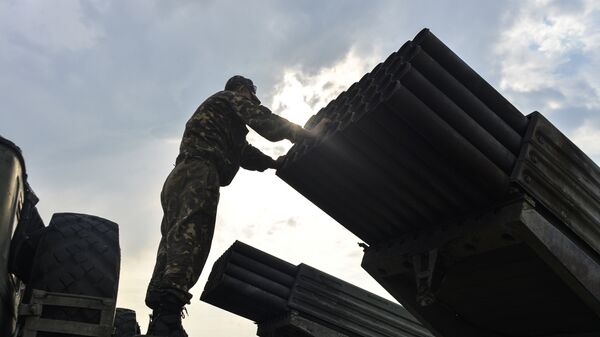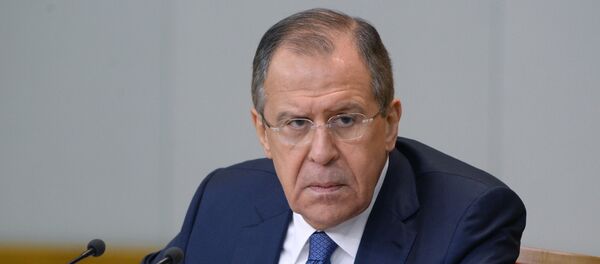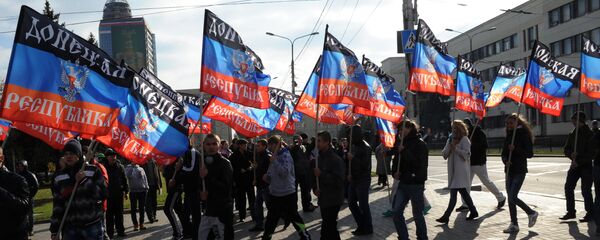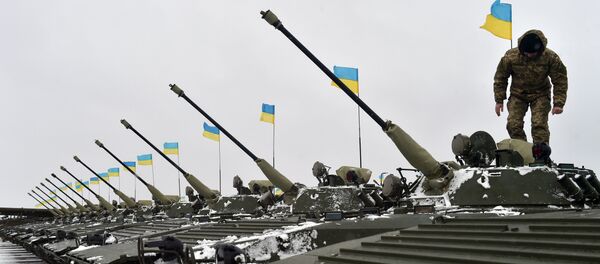One year after the signing of the Minsk II agreement on peace in eastern Ukraine, the ceasefire is holding, heavy weapons have been pulled back from the contact line, the two sides have conducted several rounds of prisoner exchanges, and the security situation on the ground has improved.
At the same time, many of the agreement's 13 points remain unfulfilled, including the key requirement that Ukraine reform its constitution to recognize the special status of the breakaway Donbass republics.
So far Ukrainian President Petro Poroshenko has been unable to push constitutional reforms granting the Donbass republics autonomy through Ukraine's parliament, failing to find the necessary majority from his coalition partners.
At the same time, a number of other issues remain unresolved, including the precise conditions for the holding of local elections in areas of the Donbass region outside of Kiev's control.
For their part, Ukrainian leaders insist that the elections should take place only following a complete cease-fire, and after Ukraine regains complete control over the state border. At the same time, they demand that the political forces which emerged in Ukraine in the aftermath of the 2014 Maidan coup d'état must be allowed to participate in the local elections.
With the agreement entering its second year, Russia's RIA Novosti presents three scenarios for the future of eastern Ukraine.
Option #1: Full Implementation of Minsk II
Unfortunately, RIA Novosti suggests, "despite the fact that most experts see the Minsk agreements as the only way to resolve the conflict in southeastern Ukraine, they have little confidence in the notion that the agreements can be fulfilled in the current year."
Ruslan Bortnik, the Director of the Ukrainian Institute of Policy Analysis and Management, told the news agency that the agreements will need at least one year, and possibly two, to be realized.
"The Minsk agreements will be fulfilled, in one way or another, perhaps with revisions, but only in 2017 or 2018. Today the conditions for their implementation do not yet exist," the analyst said.
With some experts speculating on the possibility of a 'Minsk III', President Poroshenko, for his part, insists that there will be no new agreement, suggesting instead that it is necessary to create a 'road map' to implement Minsk II featuring precise deadlines. Given that the ball is in Kiev's court as far as the stalled negotiations go, it's unclear why the Ukrainian president would be so insistent on stricter deadlines.
Option #2: New Hostilities
A second option, Bortnik says, is an escalation and possible re-ignition of the conflict. This option, the analyst emphasizes, wouldn't serve anyone's interests.
For his part, Nikolai Sungurovsky, the director of military programs at Ukraine's Razumkov Center, warned that if an escalation were to take place, it is likely to happen before the fall.
"The scenario for an escalation of the conflict, before the autumn, is, I think, the most likely and dangerous. I believe, unfortunately, that a military option will be implemented." The spark for an escalation, Sungurovsky noted, would likely be connected to the local elections being prepared in the Donbass republics. He did not clarify which side would strike first in such a scenario.
Option #3: Frozen Conflict
The third and most likely option, especially in the coming year, is the 'freezing' of the conflict and the continuation of the negotiation process, RIA Novosti writes.
At the moment, Bortnik notes, conditions are not ripe for implementing the Minsk agreements; therefore, both sides would be best served to continue looking for compromise.
"I think that in the current year, the most likely scenario is a freezing of the conflict. It will not be a palpable freezing, but rather the continuation of negotiations without a concrete result."
"The freezing of the conflict would require the absence of any kind of activity by the West, because on its own, Ukraine cannot cope with the conflict," the analyst noted. The absence of an "active" West, in his words, would lead negotiations into a deadlock, "and the conflict would become frozen." Naturally, Sungurovsky insisted, this option is not desirable for Kiev.
Minsk II Must Succeed, Belarus Insists
In a separate interview with RIA Novosti, Belarusian Foreign Minister Vladimir Makei said that the Minsk II negotiations format has already demonstrated its value by halting the hostilities, and emphasized that both sides must continue to push for the agreements' complete implementation.
"The laborious, behind-the-scenes, persistent work of the contact group on the restoration of peace and stability must be fully supported," the minister insisted.
For its part, Belarus, which offered the platform for the negotiations in its capital for the Minsk I and Minsk II accords, has vowed to do everything in its power to help. "We are ready to provide secretarial, organizational and protocol support, and finances to facilitate the talks, without interfering in the work," Makei noted.







